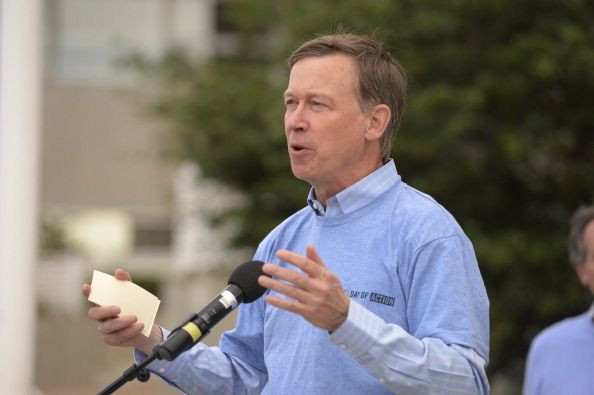'Reckless': Colorado Gov. Hickenlooper Walks Back Pot Legalization Comment

A day after calling his state's voters "reckless" for legalizing marijuana, Colorado Gov. John Hickenlooper is trying to walk back his criticism with a statement praising his constituents for challenging a "failed" drug war and promising to enforce the new law. He said Colorado has succeeded in implementing the new law in a way that has mitigated potential risks.
“Context is everything," Hickenlooper said in a statement released by his office. "I was asked if I thought it was reckless to legalize marijuana in Colorado -- perhaps risky is a better word. While I believe it was risky for Colorado to be the first state to step away from a failed federal policy given all of the unanswered legal questions and implications, the adoption of Amendment 64 by Colorado voters sent a clear message to the federal government that marijuana should be legal and regulated."
Hickenlooper added: "We have a robust regulatory enforcement system that would not have been possible without the partnership of the marijuana business owners, activists, law enforcement officials, regulators, parents, policy experts and stakeholders. Together we have worked tirelessly to ensure a safe and fair system that protects the public health, diminishes the underground market, and educates and keeps marijuana out of the hands of our children. We remain committed to carrying out the will of the voters, including providing marijuana businesses access to banking and maintaining a fair regulatory system.”
During yesterday's candidate debate sponsored by the Denver Metro Chamber of Commerce, Hickenlooper was asked about his views on Colorado voters' decision in 2012 to pass a ballot measure legalizing marijuana for recreational use.
"I think for us to do that without having all the data, there is not enough data, and to a certain extent you could say it was reckless," he replied. "I'm not saying it was reckless because I'll get quoted everywhere, but if it was up to me I wouldn't have done it, right. I opposed it from the very beginning. In matter of fact, all right, what the hell -- I'll say it was reckless."
Hickenlooper, who made his personal fortune as a brewer and beer promoter, did not offer any criticism of alcohol, despite evidence that it is a more toxic drug than marijuana.
The Durango Herald reports that moments after Hickenlooper made the comment, the governor's director of marijuana coordination contacted representatives of the marijuana industry to try to tamp down their outrage.
At the same time, the Marijuana Policy Project's Mason Tvert, who was one of the architects of the 2012 ballot measure, told the Huffington Post: "Politically, it’s a pretty reckless statement. Gov. Hickenlooper was elected by 51 percent of the state’s voters, whereas 55 percent approved the marijuana initiative in 2012. Some of them might now be thinking they made a pretty reckless decision when they voted him into office."
On Tuesday, Tvert responded to the governor's walk-back:
It’s nice to hear the governor doesn’t actually think we’re reckless, but it’s still a mystery why he thinks ending a failed policy like marijuana prohibition is so risky. Prior to the passage of Amendment 64, marijuana was being sold by criminals in an uncontrolled underground market, where it was untaxed and universally available to teens. Now it is being sold by legitimate, taxpaying businesses in a tightly regulated market in which customers are actually required to provide proof of age. How is that taking a risk? Marijuana is far less harmful than alcohol, and the decision to end marijuana prohibition is far less risky than the decision to end alcohol prohibition. And voters in 2012 had far more data available about marijuana than voters in 1932 had about alcohol. It’s because voters took that ‘risk' more than 80 years ago that the governor was able to attend the Great American Beer Festival last weekend and broadcast his love of alcohol to the world via Twitter."
This story was updated at 8 p.m. to include Tvert's comment.
© Copyright IBTimes 2025. All rights reserved.






















